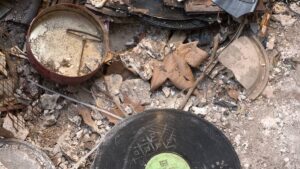Rubbish recyclers are top of the heap despite stockpiling scandals

Top of the heap ... Rubbish collectors Bingo and Cleanaway have reported strong results. Picture: Getty
It’s been one crisis after another for the East Coast recycling industry — but not for the country’s two listed waste management companies.
Bingo Industries presented an after-tax profit of $32 million. Its much larger rival, Cleanaway, snagged $72.5 million — up 62 per cent.
Bingo Industries (with the delightful ASX code of BIN) is a newcomer to the listed waste management sector, joining the bourse in May. But it appears to well understand the theory of under-promise, over-deliver.
Bingo predicted in its prospectus aggressive net profit growth of $31.1 million this financial year, rising to $40.7 million next year. Revenue was forecast at $203.4 million, climbing to $259 million in 2017-18. In fact, this year it was $209.7 million.
Bingo’s chief development officer Chris Jeffrey told Stockhead he was very pleased to have exceeded the guided figures released when the company listed.
The sector has faced some terrible PR since December, when a Four Corners report revealed recyclers were stockpiling glass after the bottom fell out of the reseller market.
Stockpiling at an SKM recycling plant in Coolaroo, Victoria, caused a major fire in July that took 11 days to bring under control. Another Four Corners report revealed that NSW waste companies were dumping their trash in Queensland, to avoid their home state’s landfill levy. And a report by government agency Sustainability Victoria pointed to the creation of mega-landfills to manage the State’s future waste generation.
This has affected neither Bingo nor Cleanaway’s share price. Bingo closed up 5 per cent at $2.05 yesterday and Cleanaway was at the upper end of its 52-week trading range.
Indeed, Bingo’s 31-year-old chief executive Daniel Tartak has clearly seen an opportunity in Victoria, buying three metropolitan recycling businesses in the State for $38 million.
Mr Tartak, who was responsible for listing the Tartak family business, says he intends to follow the same vertically integrated collection and recycling model that works in NSW.
Bingo’s Mr Jeffry said legislation such as minimum recycling standards, green zones, and recycling rates agreements for large infrastructure made Victoria the second most attractive state for Bingo.
“Victoria is like NSW was a few years ago,” he said: fragmented and ready for change.
The company is currently lobbying for Queensland political parties to take a landfill levy to the next election, and would like to see national standards set for waste management.
UNLOCK INSIGHTS
Discover the untold stories of emerging ASX stocks.
Daily news and expert analysis, it's free to subscribe.
By proceeding, you confirm you understand that we handle personal information in accordance with our Privacy Policy.








